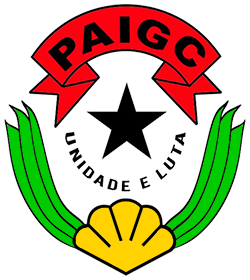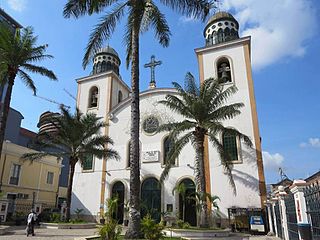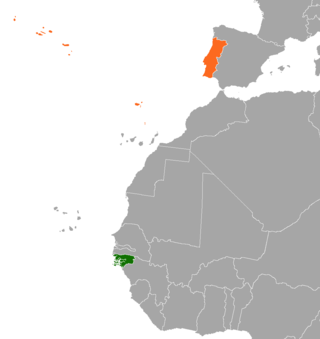
The economy of Guinea-Bissau comprises a mixture of state-owned and private companies. Guinea-Bissau is among the world's least developed nations and one of the 10 poorest countries in the world, and depends mainly on agriculture and fishing. Cashew crops have increased remarkably in recent years, and the country ranked ninth in cashew production for the year of 2019.

The recorded history of Cape Verde begins with the Portuguese discovery of the island in 1456. Possible early references to Cape Verde date back at least 2000 years.

Luís Severino de Almeida Cabral was a Bissau-Guinean politician who was the first President of Guinea-Bissau. He served from 1974 to 1980, when a military coup d'état led by João Bernardo Vieira deposed him. Luís Cabral was a half-brother of Amílcar Cabral, with whom he co-founded the African Party for the Independence of Guinea and Cape Verde (PAIGC) in 1956.

Portuguese Guinea, called the Overseas Province of Guinea from 1951 until 1972 and then State of Guinea from 1972 until 1974, was a West African colony of Portugal from 1588 until 10 September 1974, when it gained independence as Guinea-Bissau.

The African Party for the Independence of Guinea and Cape Verde is a political party in Guinea-Bissau. Originally formed to peacefully campaign for independence from Portugal, the party turned to armed conflict in the 1960s and was one of the belligerents in the Guinea-Bissau War of Independence. Towards the end of the war, the party established a socialist one-party state, which remained intact until multi-party democracy was introduced in the early 1990s. Although the party won the first multi-party elections in 1994, it was removed from power in the 1999–2000 elections. However, it returned to office after winning parliamentary elections in 2004 and presidential elections in 2005, since which it has remained the largest party in the National People's Assembly.

The Guinea-Bissau War of Independence, or the Bissau-Guinean War of Independence, was an armed independence conflict that took place in Portuguese Guinea from 1963 to 1974. It was fought between Portugal and the African Party for the Independence of Guinea and Cape Verde, an armed independence movement backed by Cuba, the Soviet Union, and Yugoslavia. The war is commonly referred to as "Portugal's Vietnam" because it was a protracted guerrilla war which had extremely high costs in men and materiel and which created significant internal political turmoil in Portugal.

Portuguese is spoken in a number of African countries and is the official language in six African countries: Angola, Mozambique, Guinea-Bissau, Cape Verde, São Tomé and Príncipe and Equatorial Guinea. There are Portuguese-speaking communities in most countries of Southern Africa, a mixture of Portuguese settlers and Angolans and Mozambicans who left their countries during the civil wars. A rough estimate has it that there are about 14 million people who use Portuguese as their sole mother tongue across Africa, but depending on the criteria applied, the number might be considerably higher, since many Africans speak Portuguese as a second language, in countries like Angola and Mozambique, where Portuguese is an official language, but also in countries like South Africa and Senegal, thanks to migrants coming from Portuguese-speaking countries. Some statistics claim that there are over 41.5 million Portuguese speakers in the continent. Africa is, therefore, the continent with the second-most Portuguese speakers in the world, only behind the Americas. Like French and English, Portuguese has become a post-colonial language in Africa and one of the working languages of the African Union (AU) and the Southern African Development Community (SADC). Portuguese co-exists in Guinea-Bissau, Cape Verde, and São Tomé and Principe with Portuguese-based creoles, but Portuguese continues to be the official language of these countries. Additionally, Portuguese has become the national language of Angola, as it is so widely spoken in every segment of society, and serves as the home language of the majority of the Angolan population, particularly in the big towns and cities. A few native African languages continue to be spoken, but are losing ground to Portuguese. In Mozambique, in addition to Portuguese as the official language, it is fast becoming the lingua franca. And as in Angola, Portuguese is the dominant spoken language in the urban areas of the country. In the five former African Portuguese colonies, Portuguese is the language of: commerce, the government, courts, schools and mass media.

The Portuguese Colonial War, also known in Portugal as the Overseas War or in the former colonies as the War of Liberation, and also known as the Angolan, Guinea-Bissau and Mozambican War of Independence, was a 13-year-long conflict fought between Portugal's military and the emerging nationalist movements in Portugal's African colonies between 1961 and 1974. The Portuguese regime at the time, the Estado Novo, was overthrown by a military coup in 1974, and the change in government brought the conflict to an end. The war was a decisive ideological struggle in Lusophone Africa, surrounding nations, and mainland Portugal.

The Portuguese-speaking African countries, also known as Lusophone Africa, consist of six African countries in which the Portuguese language is an official language: Angola, Cape Verde, Guinea-Bissau, Mozambique, São Tomé and Príncipe and, since 2011, Equatorial Guinea. The six countries are former colonies of the Portuguese Empire. From 1778 until independence, Equatorial Guinea was also a colony of the Spanish Empire.
The African independence movements took place in the 20th century, when a wave of struggles for independence in European-ruled African territories were witnessed.
Portuguese Africans are Portuguese people born or permanently settled in Africa. The largest Portuguese African population lives in Portugal numbering over 1 million with large and important minorities living in South Africa, Namibia and the Portuguese-speaking African countries .The descendants of the Portuguese settlers who were born and "raised" locally since Portuguese colonial time were called crioulos. Much of the original population is unnumbered having been assimilated into Portugal, Brazil, and other countries.

Portuguese Angolans are citizens of Angola who are either descended from Portuguese people or Portuguese emigrants permanently living in Angola. The number of Portuguese Angolans precipitously dropped during and immediately after the Angolan War of Independence, but several hundreds of thousands have either returned or emigrated to live in Angola. As of 2022, they make up approximately 0.6% of Angola's population.
Portuguese Mozambicans are Mozambican-born descendants of Portuguese settlers.

Guinean Portuguese is the variety of Portuguese spoken in Guinea-Bissau, where it is the official language.
White Africans of European ancestry refers to people in Africa who can trace full or partial ancestry to Europe. In 1989, there were an estimated 4.6 million white people with European ancestry on the African continent. Most are of Dutch, Portuguese, British, German and French origin; and to a lesser extent there are also those who descended from Italians, Spaniards, Greeks, and Scandinavians. The majority once lived along the Mediterranean coast or in Southern Africa.
The Two Faces of War is a 2007 documentary shot in Guinea-Bissau, Cape Verde and Portugal that includes a series of interviews and testimonies of people who lived through the period of the anti-colonial war and liberation in Guinea-Bissau. This documentary, directed by Diana Andringa and Flora Gomes, sets the tone for a debate around the themes of reconciliation and historical memory in the post-conflict period of the Portuguese colonial war.

Portuguese Angola refers to Angola during the historic period when it was a territory under Portuguese rule in southwestern Africa. In the same context, it was known until 1951 as Portuguese West Africa.

Cape Verde–Guinea Bissau relations refers to the bilateral relationship between the Republic of Cape Verde and the Republic of Guinea-Bissau. Cape Verde is an island country about 900 km north-west of Guinea-Bissau, a coastal West African country. Both were colonies of the Portuguese Empire and they campaigned together for independence with a plan for unification, but the countries separated after 1980.

Guinea-Bissau–Portugal relations refers to the bilateral relations between Guinea-Bissau and Portugal. Both nations are members of the Community of Portuguese Language Countries and the United Nations.
The post-colonial age refers to the period since 1945, when numerous colonies and possessions of major Western countries began to gain independence, in the wake of the end of World War II.













